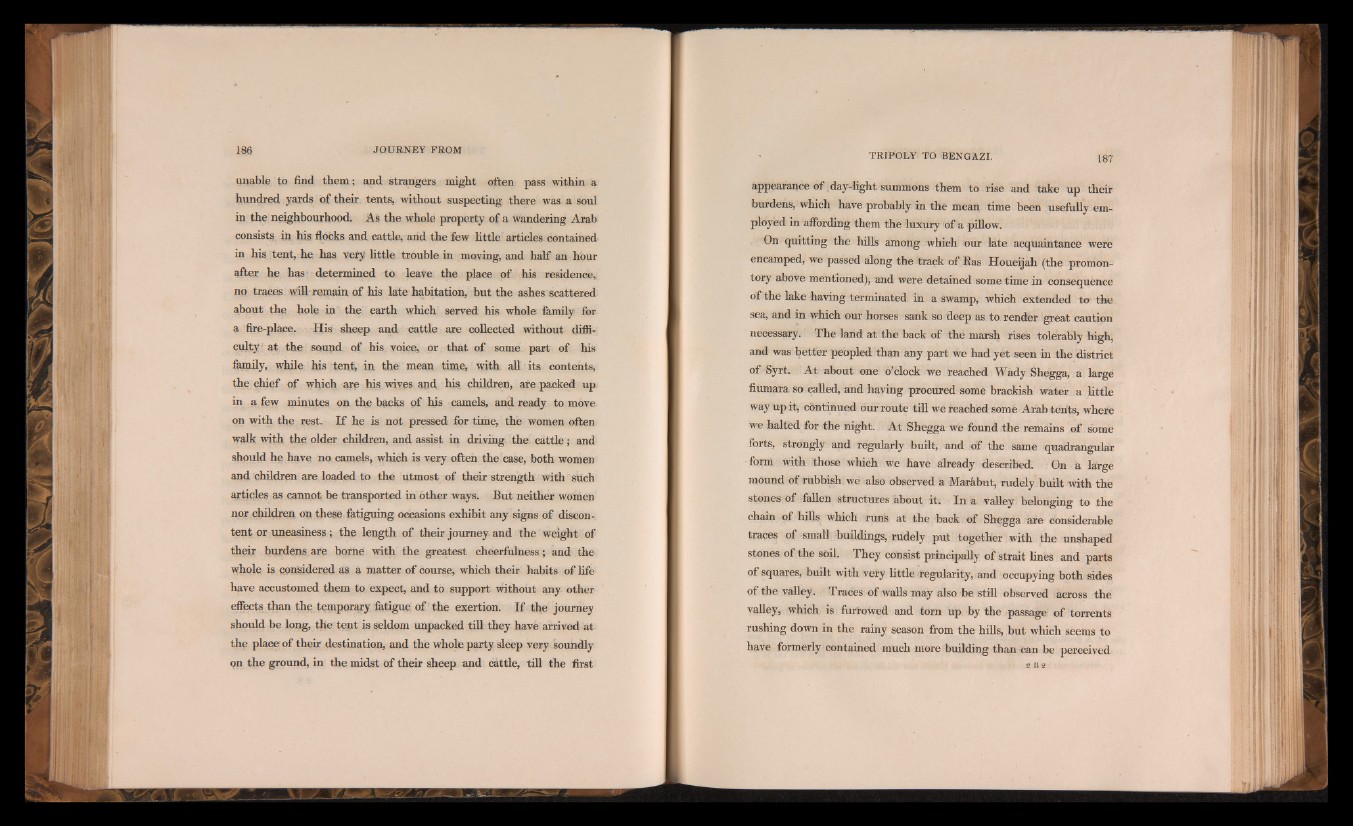
unable to find them; and strangers might often pass within a
hundred yards of their tents, without suspecting there was a soul
in the neighbourhood. As the whole property of a wandering Arab
consists in his flocks and cattle, and the few little articles contained
in his tent, he. has very little trouble in moving, and half an hour
after he has determined to leave the place of his residence,
no traces will remain of his late habitation, but the ashes scattered
about the hole in the earth which served his whole family for
a fire-place. His sheep and cattle are collected without difficulty
at the sound of his voice, or that of some part of his
family, while his tent, in the mean time, with all its contents,
the chief of which are his wives and his, children, are packed up
in a few minutes on the backs of his camels, and ready to move
on with the rest. If he is not pressed for time, the women often
walk with the older children, and assist in driving the cattle; and
should he have no camels, which is very often the case, both women
and children are loaded to the utmost of their strength with such
articles as cannot be transported in other ways. But neither women
nor children on these fatiguing occasions exhibit any signs of discontent
or uneasiness; the length of their journey and the weight of
their burdens are borne with the greatest cheerfulness; and the
whole is considered as a matter of course, which their habits of life
have accustomed them to expect, and to support without any other
effects than the temporary fatigue of the exertion. If the journey
should be long, the tent is seldom unpacked till they have arrived at
the place of their destination, and the whole party sleep very soundly
on the ground, in the midst of their sheep and cattle, till the first
appearance of day-light summons them to rise and take up their
burdens, which have probably in the mean time been usefully employed
in affording them the luxury of a pillow.
On quitting the hills among which our late acquaintance were
encamped, we passed along the track of Has Houeijah (the promon-
tory above mentioned), and were detained some time in consequence
of the lake having terminated in a swamp, which extended to the
sea, and in which our horses sank so deep as to render great caution
necessary. The land at the back of the marsh rises tolerably high,
and was better peopled than any part we had yet seen in the district
of Syrt. At about one o’clock we reached Wady Shegga, a large
fiumara so called, and having procured some brackish water a little
way up it, continued our route till we reached some Arab terits, where
we halted for the night. At Shegga we found the remains of some
forts, strongly and regularly built, and of the same quadrangular
form with those which we have already described. Qn a large
mound of rubbish we also observed a Marhbut, rudely built with the
stones of fallen structures about it. In a valley belonging to the
chain of hills which runs at the back of Shegga are considerable
traces of small buildings, rudely put together with the unshaped
stones of the soil. They consist principally of strait fines and parts
of squares, built with very little regularity, and occupying both sides
of the valley. Traces of walls may also be still observed across the
valley, which is furrowed and torn up by the passage of torrents
rushing down in the rainy season from the hills, but which seems to
have formerly contained much more building than can be perceived
S I! 2